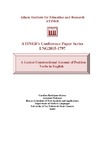Identificador persistente para citar o vincular este elemento:
https://accedacris.ulpgc.es/jspui/handle/10553/70975
| Título: | A lexical constructional account of position verbs in english | Autores/as: | Rodríguez Juárez, Carolina Fátima | Clasificación UNESCO: | 5701 Lingüística aplicada | Palabras clave: | Meaning representation Lexical and constructional templates Lexical Constructional Model Role and Reference Grammar |
Fecha de publicación: | 2016 | Publicación seriada: | Atiner's Conference Paper Series | Conferencia: | ATINER Conference | Resumen: | This research aims to illustrate the explanatory potential of the Lexical Constructional Model (LCM), as outlined in Ruiz de Mendoza (2013), Ruiz de Mendoza and Mairal (2007, 2008) and Mairal and Ruiz de Mendoza (2006, 2009a/b, 2011) and Role and Reference Grammar (RRG) (Van Valin and LaPolla 1997, Van Valin 2005) for the study of the semantic and syntactic description of predicates. The LCM combines the assumptions from functional and constructional models of linguistic description and aims to explore the relationship between lexical and syntactic meaning. In this sense, it provides a basis for the characterization of the logical structure of verbs, their semantic content (lexical templates) and the cognitive and pragmatic constraints which might block or, on the contrary, license the merging of lexical templates and other higher-level constructions. By following the methodological assumptions of the LCM and RRG, we aim to provide the semantic representation of a group of verbal predicates belonging to the domain of verbs of position in English. In doing so, we will first analyse the different syntagmatic behaviour of the predicates under concern by providing the structural patterns and constructions in which they participate (Levin 1993). Then, we will formulate their lexical and constructional templates at the core grammar level of description and explore the internal constraints which regulate the process of lexical-constructional subsumption and which motivate their different syntactic behaviour. With this study, we intend to show that the LCM and RRG methodologies are adequate in order to capture the logical structures and constructional templates of predicates and that their analytical tools are valuable and effective when describing and constructing the meaning of predicates. | URI: | https://accedacris.ulpgc.es/handle/10553/70975 | ISSN: | 2241-2891 | Fuente: | Atiner's Conference Paper Series [ISSN 2241-2891], LNG2015- 1797 |
| Colección: | Actas de congresos |
Visitas 10
285
actualizado el 15-ene-2026
Descargas
78
actualizado el 15-ene-2026
Google ScholarTM
Verifica
Comparte
Exporta metadatos
Los elementos en ULPGC accedaCRIS están protegidos por derechos de autor con todos los derechos reservados, a menos que se indique lo contrario.
